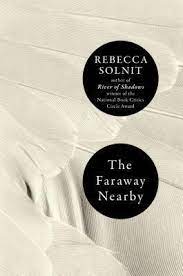
In the final essay of her book, The Faraway Nearby, Rebecca Solnit proposes, sensibly enough, that we are not ourselves. The pronoun “I” is suspect, in other words, but for a reason most of us wouldn’t consider: stories.
I’ll let Solnit speak for herself with a few relevant paragraphs:
“Listen: you are not yourself, you are crowds of others, you are as leaky a vessel as was ever made, you have spent vast amounts of your life as someone else, as people who died long ago, as people who never lived, as strangers you never met. The usual I we are given has all the tidy containment of the kind of character the realist novel specialize in and none of the porousness of our every waking moment, the loose threads, the strange dreams, the forgetting and misremembering, the portions of a life lived through others’ stories, the incoherence and inconsistency, the pantheon of dei ex machina and the companionability of ghosts. There are other ways of telling.
“As I was approaching this chapter, I woke up in the middle of the night and thought something I should have written down at the time. The empty shell of it that washed up on the shores of morning was to the effect that sometimes an extraordinary or huge question comes along and we try to marry it off to a mediocre answer. The protagonists of fairy tales and fables embody questions about who we are, what we desire, how to live, and the endings are not the real answers. During the quest and crises of a fairy tale the protagonist is nobody, possessed only of the powers of determination, resourcefulness, and alliance, an unconventional estimation of what matters. Then at the end, the story breaks with its own principles and unleashes an avalanche of conventional stuff: palaces, riches, and revenge.
“Part of the charm of [Hans Christian] Andersen’s ‘Snow Queen’ is that Gerda rescues Kai from a queen and brings him back to friendship in attics, and that’s enough. Many Native American stories don’t quite end, because the people who go into the animal world don’t come back; they become ancestors, progenitors, benefactors, forces still at work. Siddhartha is rich, thriving, loved, privileged, and protected, and walks out on all of it, as though the story were running backward. He’s born an answer and abandons that safe port to go out into a sea of questions and tasks that are never-ending.
“Essayists too face the temptation of a neat ending, that point when you bring the boat to shore and tie it to the dock and give up the wide sea. The thread is cut and becomes the ribbon with which everything is tied up, a sealed parcel, the end. It’s easy to do, and I’ve done it again and again, sometimes with a sense of betrayal of the complexity of what came before, and sometimes when I haven’t done it, an editor has asked for the gift wrap and ribbon.
“What if we only wanted openings, the immortality of the unfinished, the uncut thread, the incomplete, the open door, and the open sea? What if we liked the brothers to be swans and the nettles not yet woven into shirts, the straw better than the gold, the quest more than the holy grail? The quest is the holy grail, the ocean itself is the mysterious elixir, and if you’re lucky you realize it before you dock at the cup in the chapel.”
All of this reminds me of short story writer Peter Orner’s belief that stories should not have an ending so much as a horizon. I like open endings and unfinished business because they are more lifelike. If I were part of a feedback group asked to screen a new movie before release, for instance, I might be the lone voice saying the movie doesn’t need a neat ending where everyone lives happily ever after (Hollywood viewers love such endings, maybe, because they serve as escapist relief from viewers’ own open-ended tribulations).
But what I admire most in Solnit’s rumination is the idea of I, the Pronoun, as something that is not so much us as every story we’ve ever read, heard, or watched. We are an amalgam, a composite, a stitched tapestry of shared stories, from the fairy tales we read as children to the words that rained down from our parents’ mouths to nurture (or torture) and form us to the secrets shared with friends growing up.
The story of “I” begins but never ends, in other words. Never ends but forever changes. Think of that next time you try to be selfish. Think of that next time you set out to write, too.
